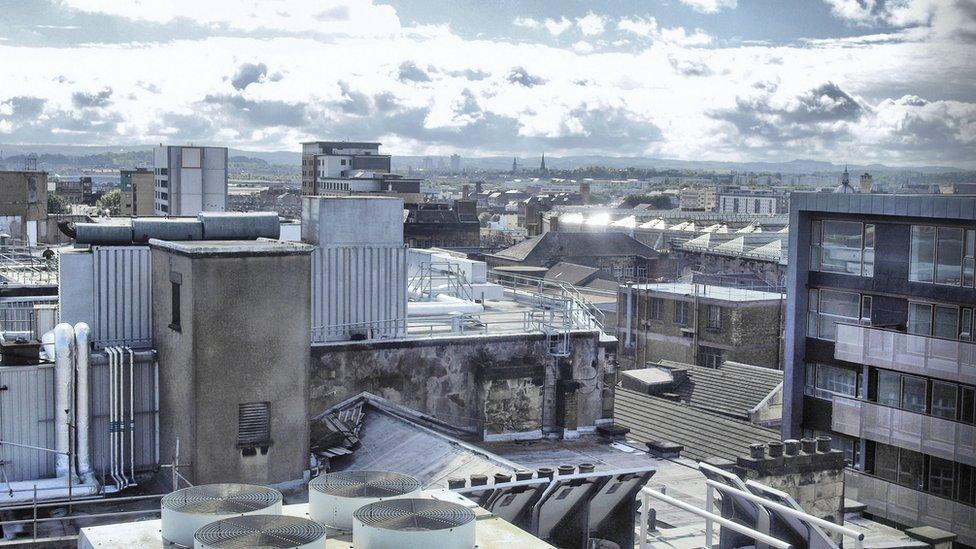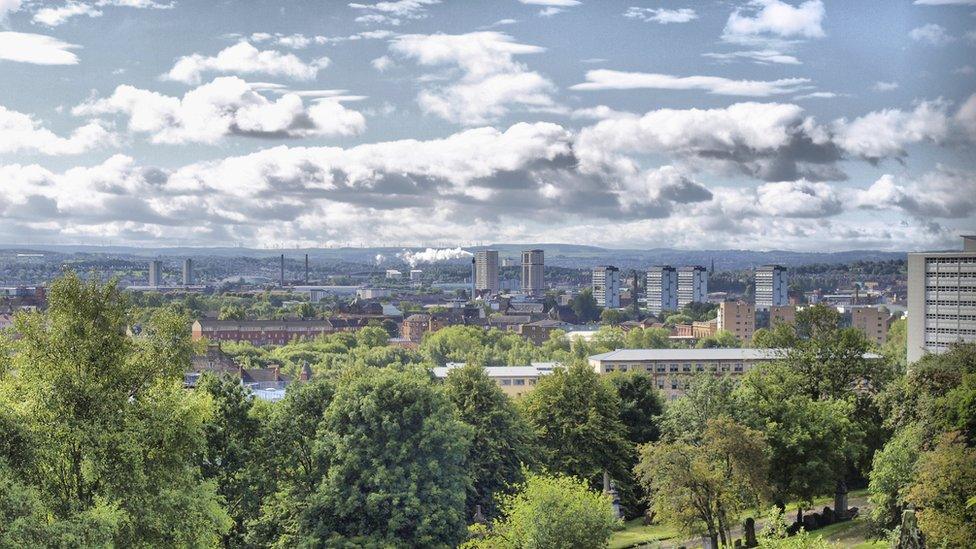Glasgow breaches WHO air pollution safety levels
- Published

Glasgow has been named among 11 urban areas in the UK and Ireland which have breached air pollution safety levels.
The city featured in the data published by the World Health Organisation (WHO), external.
The health body warned poor air quality caused more than three million deaths around the world every year.
A spokeswoman for Glasgow City Council said it took its responsibility to monitor air quality "very seriously" and its data showed it met air pollution targets in 2015.
As air quality declines, the risk of stroke, heart disease, lung cancer, and chronic and acute respiratory diseases, including asthma, increases among residents, WHO said.
One way the global health body assesses air quality is by examining the levels of a type of pollution known as particulate matter (PMs).
Glasgow was one of a number of places which breached the safe limit set for PM10.
Port Talbot, Stanford-Le-Hope, London, Scunthorpe, Leeds, Eastbourne, Nottingham, Southampton and Oxford, as well the town of Longford in Ireland, also exceeded the safe level.

More than 40 towns and cities across Britain and Ireland breached the safe levels for another measure known as PM2.5.
Glasgow and Prestonpans in East Lothian featured on that list.
WHO said that across the world 80% of cities that measure outdoor air pollution are failing to meet its guidance for safe levels of air quality.
Dr Flavia Bustreo, WHO's assistant director general for family, women and children's health, said: "When dirty air blankets our cities, the most vulnerable urban populations - the youngest, oldest and poorest - are the most impacted."
Jenny Bates, Friends of the Earth air pollution campaigner, said air pollution caused 40,000 early deaths a year in the UK.
He added: "This is a public health crisis. It's time it was treated that way.
"We need fewer and cleaner vehicles with a Clean Air Zone in every city and large town - and politicians must urgently introduce a diesel scrappage scheme to get the worst polluting vehicles off our roads, as well as more investment in alternatives to driving."
'Swift action'
Dr Penny Woods, chief executive of the British Lung Foundation, said the report was "deeply concerning".
"It is clear from this report that the UK is facing an air pollution crisis," she said.
"Unfortunately, the government's response so far has been inadequate. Swift action must be taken to reduce pollution levels in the UK and protect our lung health."
A spokeswoman for Glasgow City Council said: "Glasgow has set a target of being one of the most sustainable cities in Europe and we take our responsibility to monitor air quality very seriously.
"In fact the latest data for air quality in the city shows that both the Scottish Air Quality Objective and WHO target level for the pollutants PM10 and PM2.5 were met across the city in 2015.
"While we have made good progress, we recognise there is more to be done. The council is a key partner in the Scottish government's Clean Air for Scotland Strategy which is intended to define the path to achieving full compliance with the relevant air quality standards over the next few years."

A total of 40 towns and cities in the UK and Ireland breached safe levels for fine particles in the air, known as PM2.5, according to WHO.
Glasgow
Scunthorpe
Leeds
Eastbourne
Salford
London
Southampton
Longford, Ireland
Port Talbot
Birmingham
Stanford-Le-Hope
Chepstow
Portsmouth
Stoke-on-Trent
Oxford
Thurrock
Warrington
Armagh
Cardiff
Bray, Ireland
Norwich
Leamington Spa
Newport
Bristol
Wigan
Manchester
York
Hull
Nottingham
Plymouth
Swansea
Carlisle
Prestonpans
Liverpool
Belfast
Londonderry
Brighton
Galway, Ireland
Middlesbrough
Birkenhead
Saltash
Southend
Dublin, Ireland